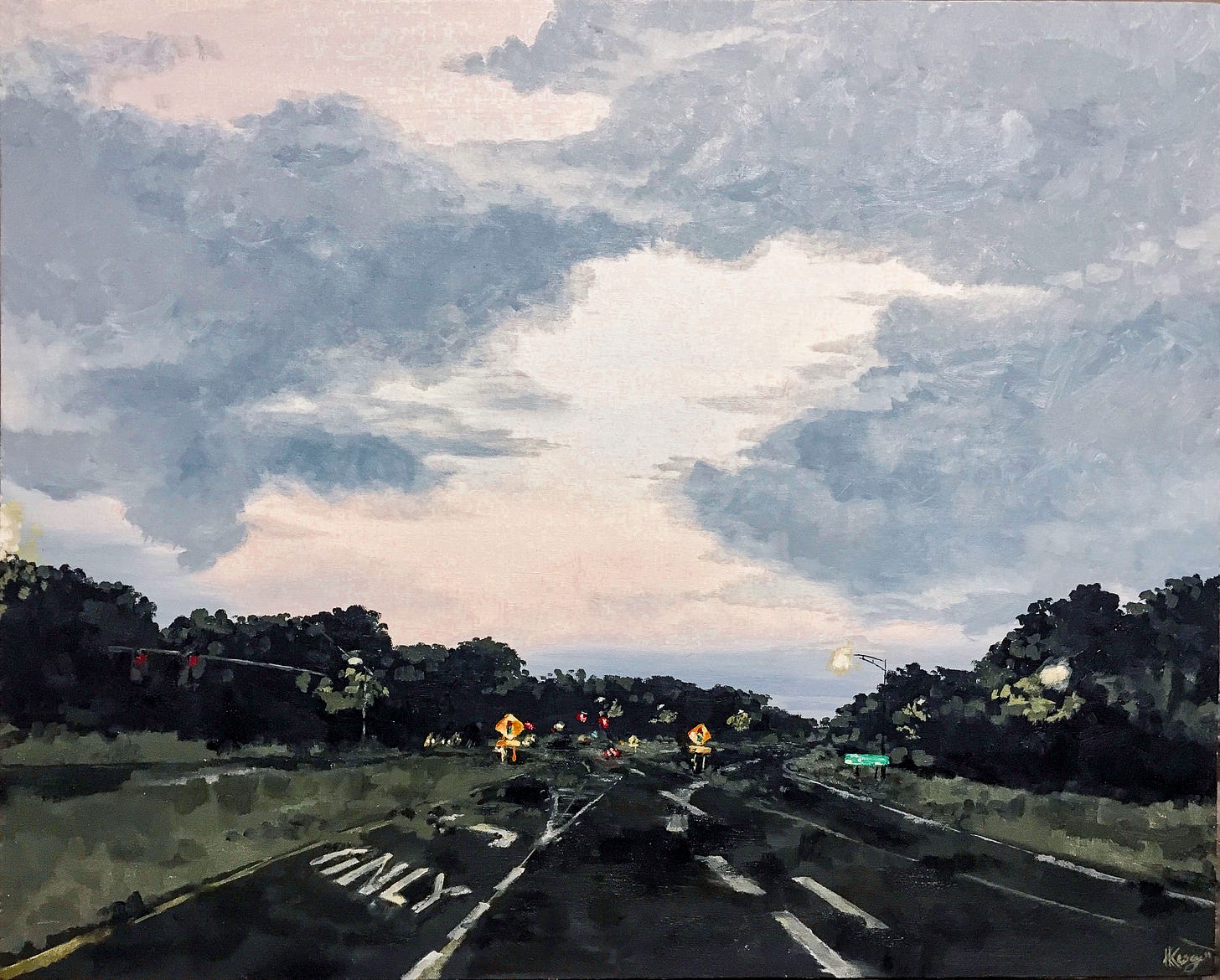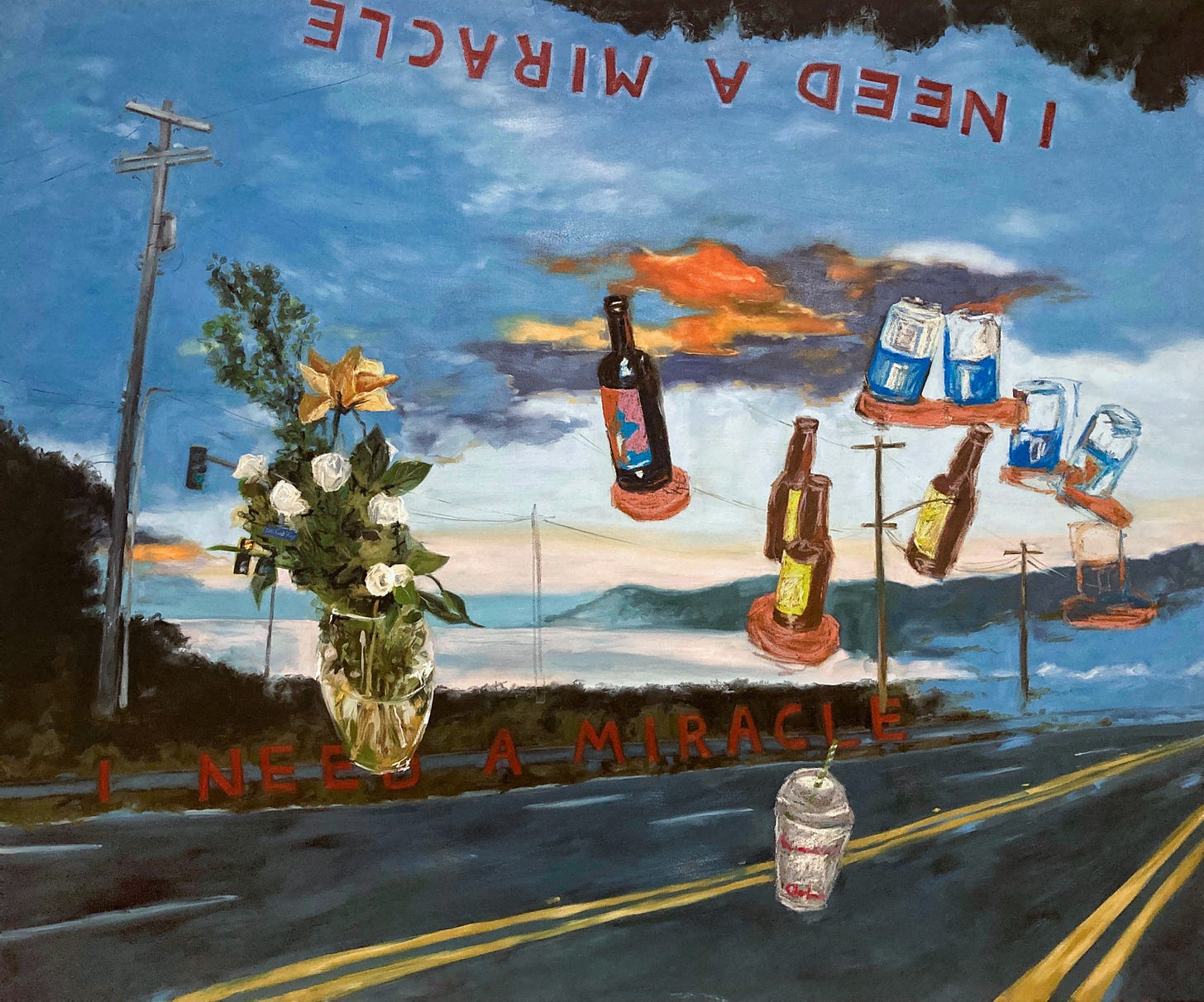
I like to go on walks in the evenings. I find comfort in the mysterious places light collects at dusk: cloistered behind curtains and blinds, falling upon a crushed can of soda on the sidewalk in a way that makes it look oddly beautiful. Everything becomes more lovely and newly strange as the world of dreams begins to take over. For a moment, beneath the weak light of street lamps, I mistake the crushed can for a fallen flower.
If I’ve had a bad day, I find myself falling in love with the world all over again on these walks. Breathing in the air of my neighbors’ gardens, I bend down to inhale the dense, surreal scent of a purple rose. However helpless or divided I thought the world was during the day no longer feels very important. Nor the meager progress I made writing. Shadows rustle like leaves across the road. TVs flicker like heartbeats. Amidst the smell of cooked food and the muffled noises of families, a softer world is revealed to me—a fragile and vital dream inside all of us.
A few evenings ago, I was crossing the street with these dusk thoughts when a car abruptly stopped in front of me. The driver rolled down his window and yelled “idiot!” at me before flooring it through the quiet streets. I’m still not sure what excessive pedestrian liberties I took at the crosswalk to earn my title, but it makes me laugh now to write about this interrupted vision of mine. If I hadn’t been so taken aback, I might have yelled back the same.

This is what the world feels like whenever I read the news: a place wherein cars hate pedestrians and pedestrians hate cars. These are the two options, and you must pick one of them. Either will require your consideration of the other as “idiot.” There’s no in between, no room for uncertainty.
The appeal of this kind of broad categorization lies in its simplicity. If everyone you do not understand can be labeled as “idiot” (i.e., not important, even stupid), the world becomes a much easier place to navigate. It becomes even logical. You are right, and everyone around you is wrong.
This kind of “knowingness” can stifle curiosity, learning, and problem-solving. Brian Klaas writes that it is not polarization that is the problem in current American politics, but willful ignorance. Klaas credits the philosopher Jonathan Lear with coining the term “knowingness,” defined as always having the answer “even before the question is asked.”
It’s a sort of survival tactic to never be wrong, to always be justified in one’s actions—likely driven by a primal need for certainty. In these instances, it often feels easier to call strangers idiots rather than wrestle with the fear within.
Yet this nation is built out of a fearsome vulnerability. The pilgrims were exiles when they came here seeking religious asylum in 1620. Today, 2.6% of Americans identify as Indigenous, according to census data, meaning that the majority of Americans are descendants of immigrants, slaves, and refugees. We are strangers, most of us, inhabiting a strange land—a land that’s been identified by its dreams for a long time.
But in the last few months, our history of dreaming is being questioned. The backlash against diversity has made that clear: mass deportations, decreased funding for foreign students, and swift legislative removal of Diversity, Equity, and Inclusion programs.
An executive order on The White House’s website now states that the nation’s legacy has been, in recent years, “reconstructed as inherently racist, sexist, oppressive, or otherwise irredeemably flawed” instead of “fostering unity and a deeper understanding of our shared past.”
Equating ignorance with unity is to take part in what the Franciscan friar Richard Rohr calls “the cult of innocence.” Instead of engaging in the difficult work of reconciliation, this belief system, taken out of Christianity, refuses to look at one’s shadows or to make peace with one’s wrongs.
While Christianity encourages the examination of sin as a necessary step of reconciliation, this step is skipped when innocence, above all else, is heralded. In such systems of belief, it’s reasoned that there’s no need to look over one’s flaws because one is inherently innocent under Christ.
Thus all signs of wrongdoing become “irredeemable.” In this framework, we cannot be unified if we admit that our nation has been sexist, racist, and oppressive, and so the dreams of our nation must instead be replaced with a kind of amnesia.
There's no doubt that the devastation of a failed dream seems impossible to face, including my own—one being the daily failure of being an artist. Nothing I write on the page is ever as good as it was in my head. Sometimes that distance feels too intense to face, so I simply don’t write. But that gap between the dream and its realization is still there; I’m just ignoring it instead of grappling with it honestly. In those moments, I could easily be tempted to yell at every pedestrian I come across. But nobody is asking me to write, and it’s a privilege of mine to pretend that discomfort isn’t there.
For the pain of a failed dream can be visceral, even catastrophic. Not everyone has the option of ignoring it. Langston Hughes catalogs the collective pain of Black Americans with exacting detail in his poem “Harlem,” whose narrator asks, “What happens to a dream deferred?”
“Does it stink like rotten meat?” the narrator considers, or “Maybe it just sags/ like a heavy load.” The poem ends with what could be the greatest fear of any government order: “Or does it explode?”
There’s nothing stranger than a dream, and perhaps, nothing more dangerous. Martin Luther King, Jr. delivered his “I Have a Dream” speech in 1963, enunciating an outcry for the land where “the rough places will be made plain, and the crooked places will be made straight.”
Is it an impossible dream? As all dreams, the vision is unnerving by daylight, under the blank sight of knowledge. Easy to disassemble, or consider unthinkable.
Maybe we are thinking too much lately, when we should be dreaming more. Without dreams, we would be no nation at all. We are a country based on dream logic. Of the beautiful and the strange, where anything might be possible.







Beautiful. Thanks for bringing up politics and how it connects to art and your day to day thoughts.